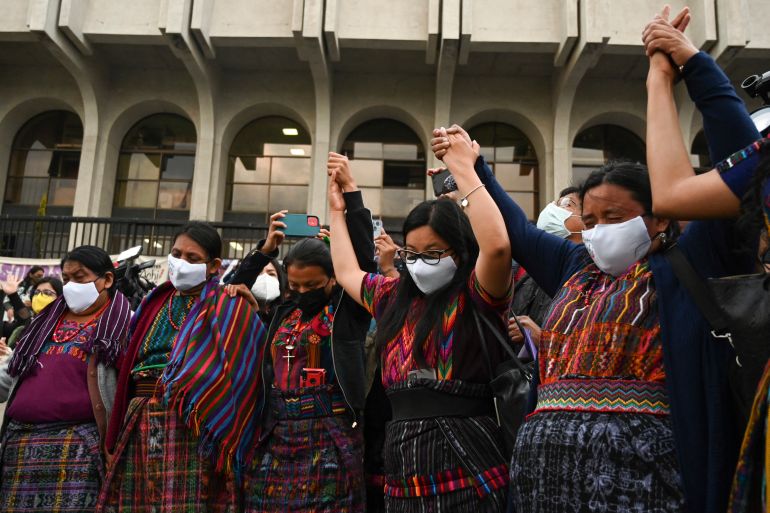Guatemala paramilitaries sentenced for raping Indigenous women
The former members of the government-recruited patrols were sentenced to 30 years for raping 36 Indigenous women.

Guatemala’s highest court has sentenced five former paramilitary soldiers to 30 years in jail for raping 36 Indigenous women during the country’s decades-long civil war.
The attacks by the former members of the so-called Civil Self-Defense Patrol (PAC), an array of armed groups recruited by Guatemala’s army, took place between 1981 and 1985 in and around the town of Rabinal, prosecutors said on Monday.
Keep reading
list of 3 itemsAnger grows in Guatemala over COVID vaccine rollout, corruption
Guatemala civil war archives help find missing
The guilty verdict on charges of crimes against humanity capped a three-week trial that saw survivors and relatives of the victims – members of the Indigenous Achi Mayan group – give graphic testimony detailing the abuses.
“The women were subjected to continuous rape and also to domestic slavery,” Gervi Sical, one of the judges, said as the sentence was read.

“We the judges firmly believe the testimonies of the women who were sexually violated,” the judge said.
Victims said members of the paramilitary group had rounded up all the men in the village and disappeared them. They then rounded up the women, tied them up and raped them.
And urinated on the victims during the attack, the witnesses said.
The five men charged included two brothers – Benvenuto and Bernardo Ruiz, aged 63 and 57 – and a trio of relatives – Damian, Gabriel and Francisco Cuxum, all in their 60s.
All of the accused heard the verdict via a videoconference from jail.
Prior to the sentencing, some of the victims, accompanied by activists, held a ceremony with flowers and candles in a plaza at the Torre de Tribunales, in the historic centre of Guatemala City.
“When I was 19 years old I was taken to the (military) detachment and was raped by soldiers, but those who are to blame are the patrolmen in my village,” Margarita Siana, 59, told the AFP news agency.
Pedrina Lopez, one of the victims, said they were not seeking revenge but rather justice.
“We don’t want this to happen again,” she said.
Relatives of former members of the paramilitary groups protested in another part of the judicial complex, denouncing what they called “false accusations” and demanding their freedom.
The Civil Self-Defense Patrols have been blamed for several atrocities committed during Guatemala’s civil war, in which an estimated 200,000 people were killed or disappeared.
In 1999, a UN-sponsored commission determined that a genocide predominantly targeting Maya Indigenous groups, who were accused of siding with groups fighting the government, had been committed by Guatemala’s military, whose officer corps had been trained by the United States.
A mass grave with the bodies of more than 3,000 people has since been discovered near Rabinal, whose population was particularly hard hit during the conflict.
Following the verdict, Lucia Xiloj, a lawyer for some of the women, told the AFP: “Once again it has been exposed that sexual violence during the internal armed conflict was a strategy implemented by (the Guatemalan state).”
The UN High Commissioner for Human Rights in Guatemala went on Twitter to say the sentence is a “landmark advance in the access to the rights to truth, justice and reparation for female victims of sexual violence during” the war.